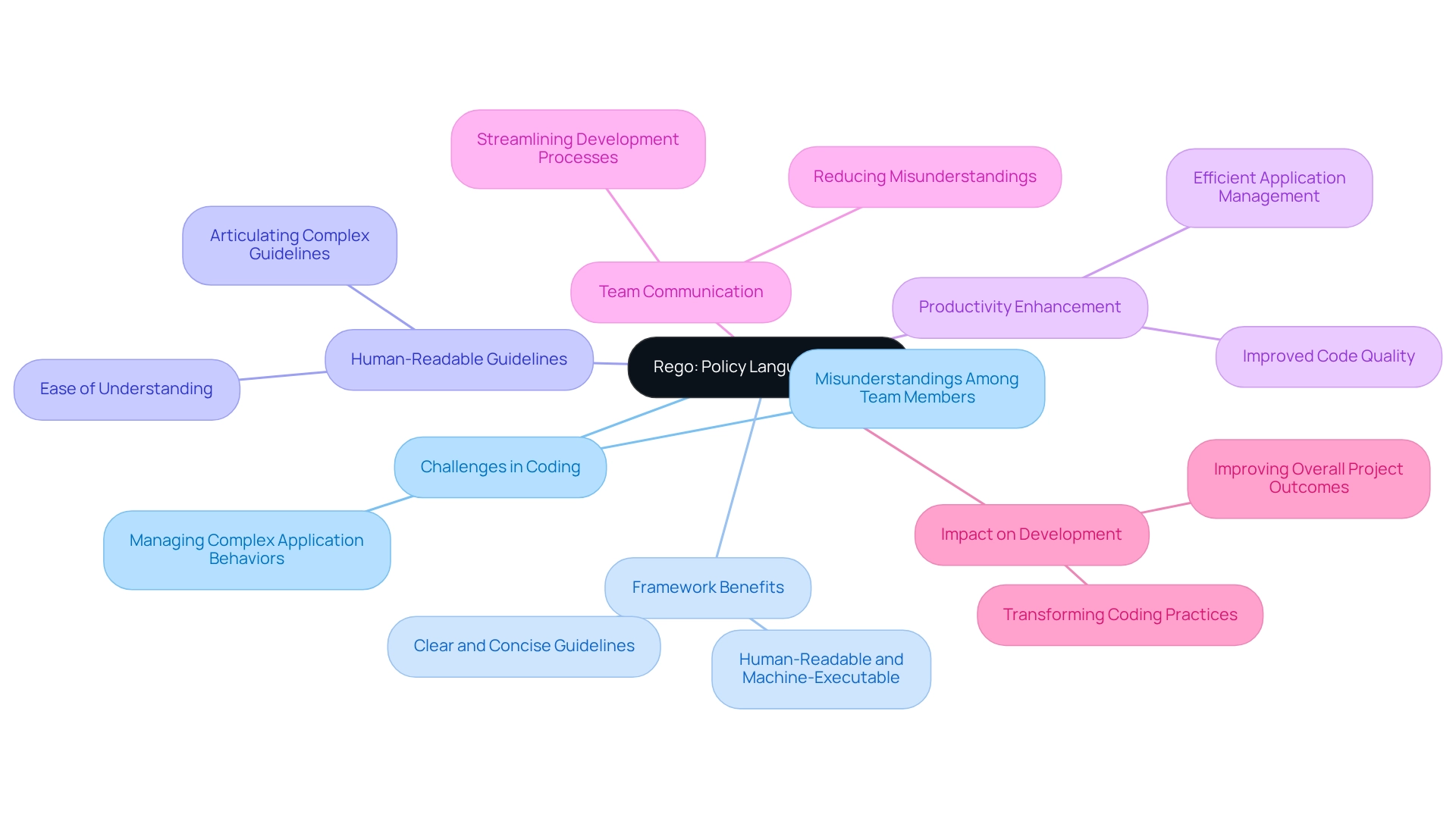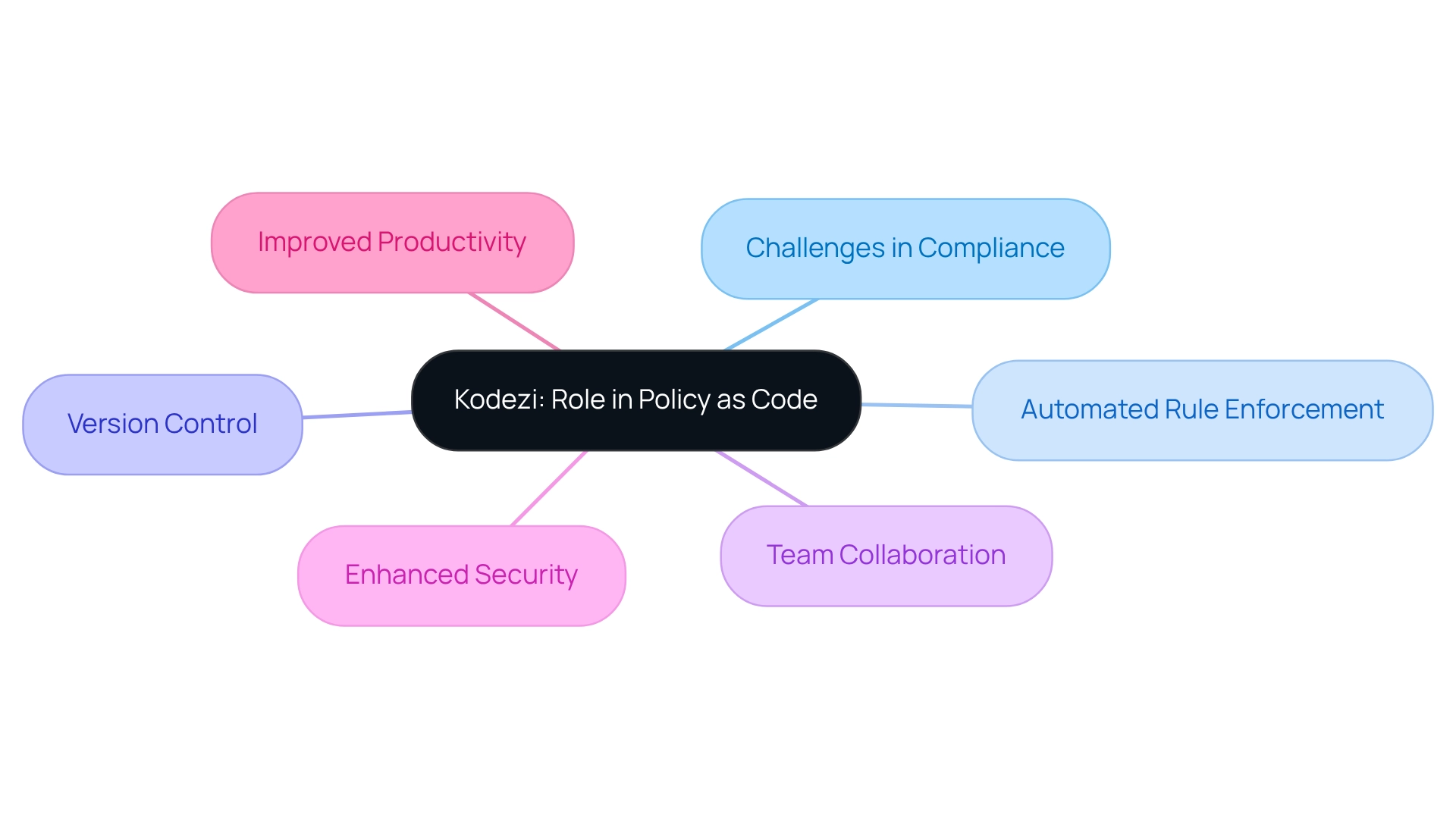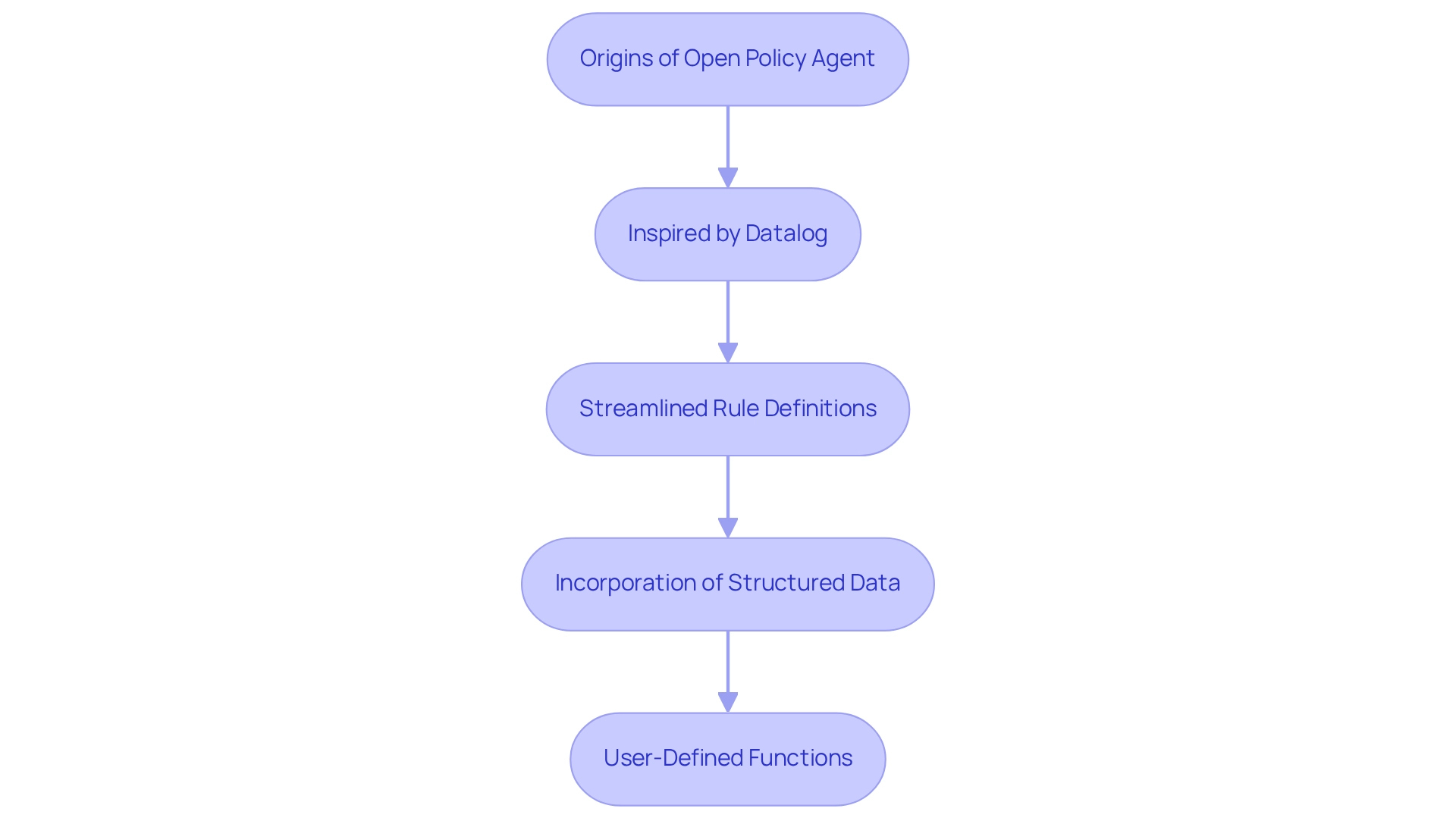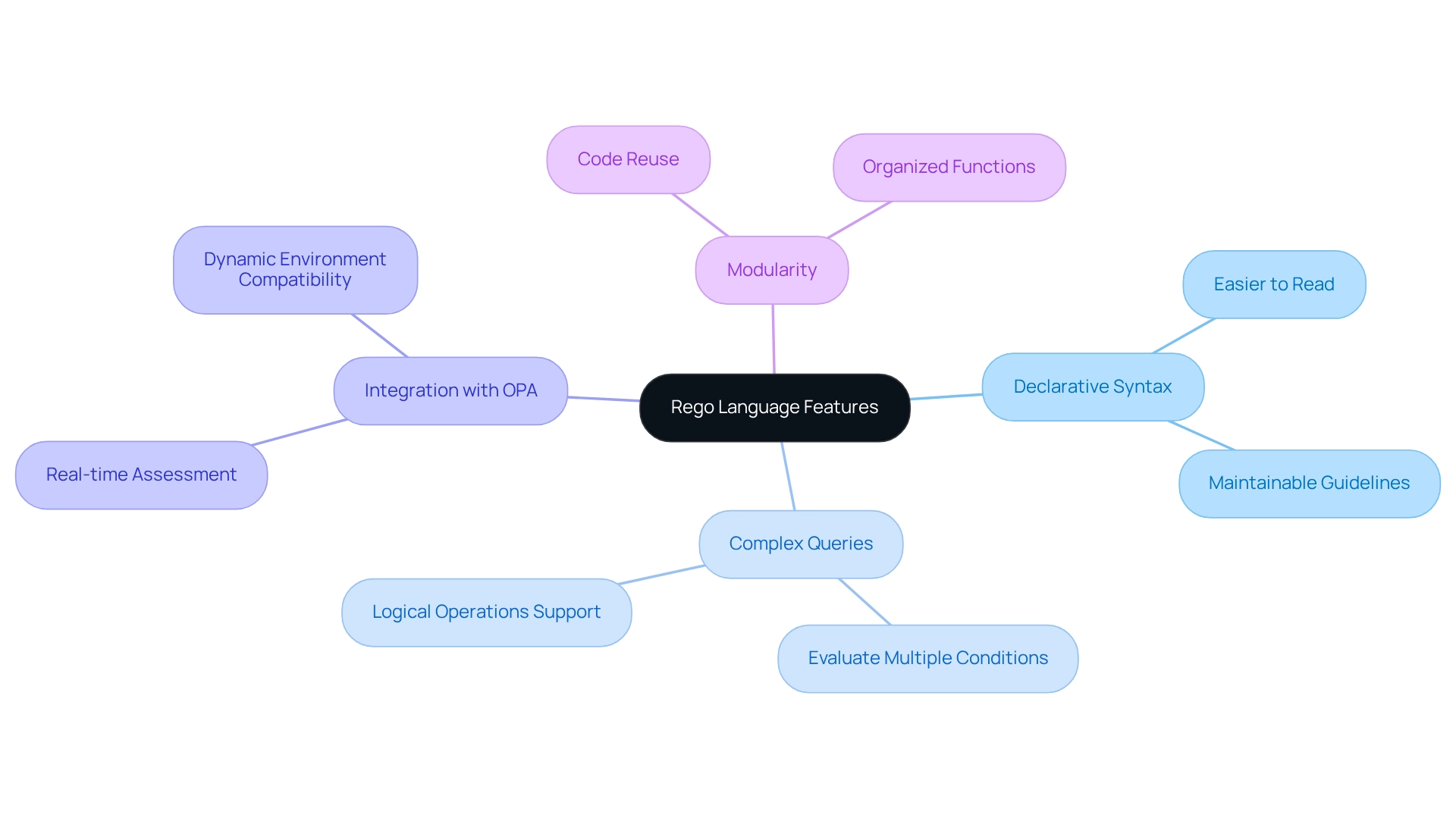Overview
Developers often encounter significant challenges when it comes to defining application behavior in a clear and efficient manner. The Rego language, a high-level declarative framework designed for the Open Policy Agent (OPA), addresses these challenges effectively. By allowing developers to define application behavior through clear and concise policies instead of intricate implementation instructions, Rego simplifies the coding process.
The declarative syntax of Rego, coupled with its support for complex queries, enhances productivity and code quality. Furthermore, its seamless integration with OPA empowers developers to manage regulatory compliance in software development more effectively. This combination of features makes Rego not just a tool, but a powerful ally in navigating the complexities of modern coding.
Imagine the time saved and the clarity gained when using a language that prioritizes simplicity and expressiveness. By adopting Rego, developers can focus on what truly matters—creating robust applications without getting lost in the minutiae of implementation details.
In conclusion, exploring the capabilities of Rego and its integration with OPA can lead to significant improvements in both productivity and code quality. Why not take the next step and delve into how Rego can transform your development practices?
Introduction
In the rapidly evolving landscape of cloud-native applications, the challenges of effective policy management are more pressing than ever. How can organizations navigate this complexity? Enter Rego, a high-level declarative policy language designed for the Open Policy Agent (OPA).
Rego simplifies the process of defining and enforcing policies across diverse systems, emphasizing desired outcomes rather than implementation details. This user-friendly yet powerful approach addresses the common pain points faced by developers.
As organizations increasingly adopt the concept of Policy as Code, Rego's integration into the software development lifecycle not only enhances security but also streamlines operations. This shift paves the way for a more collaborative and accountable approach to policy management.
This article delves into the origins, key features, and the transformative role of Rego in modern software development.
Define Rego: The Policy Language for Open Policy Agent
Developers often face significant challenges when it comes to coding, particularly in managing complex application behaviors. This high-level declarative framework, designed specifically for the Open Policy Agent (OPA), effectively addresses these challenges using the rego language. It enables users to establish clear and concise guidelines that regulate the behavior of applications and services. Unlike conventional programming languages, the rego language emphasizes what the intended result should be, rather than detailing how to achieve it. This approach renders the rego language especially beneficial for articulating complex guidelines in a manner that is both human-readable and machine-executable. OPA queries serve as assertions on data stored within OPA, allowing developers to enforce rules across various systems seamlessly. By utilizing this framework, developers can enhance productivity and ensure code quality, ultimately leading to more efficient application management.
In addition, the clarity of this framework fosters better communication among team members, reducing misunderstandings and streamlining development processes. As you explore the capabilities of OPA, consider how this innovative approach can transform your coding practices and improve overall project outcomes.

Contextualize Rego: Its Role in Policy as Code
Developers often encounter significant challenges when it comes to managing compliance within their coding practices. How can they ensure that regulations are upheld without becoming bogged down in manual processes? This is where Kodezi steps in, offering a solution that integrates rule definitions directly into the software development lifecycle. By utilizing Kodezi, organizations can automate rule enforcement, ensuring compliance is maintained effortlessly.
Furthermore, Kodezi allows developers to create regulations that are version-controlled, tested, and deployed alongside application code. This fosters a culture of collaboration and accountability among teams. In addition, the integration of these tools not only enhances security but also simplifies operations, reducing the friction often associated with managing regulations.
Imagine a scenario where your team can focus on innovation rather than compliance checks. With Kodezi, this becomes a reality, leading to improved productivity and code quality. Are you ready to explore the tools available on the platform? Discover how Kodezi can transform your development process today.

Trace the Origins of Rego: Development and Evolution
The Open Policy Agent initiative was born from the need for a cohesive management solution in cloud-native environments. This tool is designed with a strong influence from Datalog, a logic programming system recognized for its declarative nature and capability to articulate complex queries. Developers aimed to provide a streamlined method for rule definitions while ensuring the necessary adaptability for diverse applications. Over time, this system has evolved, incorporating features that enhance usability, such as support for structured data and user-defined functions. This evolution makes it a powerful resource for those involved in regulatory authoring.

Explore Key Features of Rego: Characteristics and Capabilities
Developers often encounter significant challenges when it comes to regulatory compliance and policy management. Rego language stands out as a powerful solution, boasting several key features that enhance its effectiveness as a regulatory tool. Its declarative syntax allows users to specify what they want to achieve without detailing the underlying implementation, making guidelines easier to read and maintain. Furthermore, this system supports complex queries and logical operations, enabling developers to express intricate rules that can evaluate multiple conditions.
In addition, Rego's integration with OPA enables real-time assessment against JSON data, rendering it appropriate for dynamic environments. The language also supports modularity through the use of functions, promoting code reuse and organization. These features empower developers to create robust and scalable policies that adapt to changing requirements. By leveraging the Rego language, developers can improve productivity and code quality, ultimately leading to more efficient coding practices. Explore the tools available on the platform to experience these benefits firsthand.

Conclusion
Rego emerges as a pivotal solution in the landscape of policy management, addressing the significant challenges organizations face with cloud-native applications. By utilizing a high-level declarative approach, Rego allows teams to define and enforce policies that are both straightforward and effective. Its intuitive syntax streamlines the expression of intricate rules, aligning seamlessly with the growing trend of Policy as Code, which integrates policy definitions into the software development lifecycle.
The development of Rego, driven by the demand for a cohesive policy management framework, highlights its flexibility and significance in contemporary software settings. With essential features such as support for complex queries, real-time evaluation, and modularity, Rego empowers developers to formulate scalable and robust policies that adapt to ever-changing operational requirements. This flexibility is vital in an environment where security and compliance are critical.
In summary, adopting Rego equips organizations to bolster security, optimize operations, and cultivate a culture of collaboration and accountability. As the momentum for Policy as Code continues to rise, Rego stands as an indispensable tool for organizations striving to effectively navigate the intricacies of policy management. Embracing this powerful language not only facilitates efficient policy enforcement but also contributes to a more secure and resilient application ecosystem.
Frequently Asked Questions
What challenges do developers face when coding applications?
Developers often face significant challenges in managing complex application behaviors.
What is the rego language, and how does it help developers?
The rego language is a high-level declarative framework designed for the Open Policy Agent (OPA) that allows users to establish clear and concise guidelines regulating application and service behaviors. It emphasizes what the intended result should be rather than detailing how to achieve it.
How does the rego language differ from conventional programming languages?
Unlike conventional programming languages, which focus on the step-by-step process to achieve a result, the rego language focuses on articulating the desired outcome, making it more suitable for complex guidelines that are both human-readable and machine-executable.
What are OPA queries, and what purpose do they serve?
OPA queries serve as assertions on data stored within OPA, allowing developers to enforce rules across various systems seamlessly.
What benefits does using the rego language provide to developers?
Utilizing the rego language enhances productivity, ensures code quality, and leads to more efficient application management. It also fosters better communication among team members, reducing misunderstandings and streamlining development processes.
How can the OPA framework transform coding practices?
The OPA framework can transform coding practices by improving overall project outcomes through its innovative approach to managing application behaviors and enhancing team communication.




